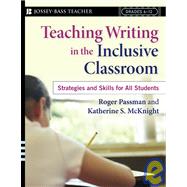
Katherine S. McKnight, Ph.D., is associate professor of secondary education and chair, Department of Teacher Education, Northeastern Illinois University, Chicago, Illinois. A former high school English teacher, she consults with the Chicago Public Schools on realigning special education courses with content area standards.
| About the Authors | |
| Acknowledgments | |
| Why Write, Anyhow? | |
| Understanding Voice, Theory, and Standards in Contemporary Classrooms | |
| What Is the TIP Writing Process | |
| Jane's Story: Learning to Participate Through an Ice Cream Social | |
| Jamie's Story: Patience and Creativity Pay Off | |
| Debbie's Story: Labels Create the "Can't" | |
| A Word About Our Goals | |
| It Ain't All Theory_But a Little Bit Helps | |
| Product Approaches: Understanding Writing As a Sum of Its Parts | |
| Process Approaches: Movement Toward Authenticity | |
| The TIP Writing Process: A Balanced, Authentic Approach | |
| Authenticity and Effective Practice | |
| Flow and Optimal Experience | |
| What We Believe About Writing | |
| What Writing Is Not | |
| What Writing Is | |
| The TIP Weekly Schedule | |
| A Few Words About Standards | |
| The Principled Argument | |
| The Assimilationist Stance | |
| A Simple Fact: Too Many Standards | |
| Acculturation Instead of Assimilation | |
| A Place for Standards | |
| Who Will Benefit From the TIP Approach? | |
| Developing Voice and Authority | |
| Lessons for Developing Voice and Authority | |
| Lists of Ten | |
| Basic Description | |
| Rich Description | |
| The Frame | |
| Round Robin Theme Exchange | |
| Sight, Smell, Taste-Touch, Sound (SST-TS) | |
| Picture Writing | |
| The Alien Encounter | |
| The Archaeologist | |
| The Blueberry | |
| The Hall Walk | |
| The Reporter | |
| Transactional Writing | |
| Visualizing | |
| Writing Directions | |
| The Friday Essay | |
| Developing Mini Lessons | |
| Using the Writing Workshop and Mini Lesson Approach | |
| Developing Mini Lessons | |
| Determine Content Need | |
| Keep Them Short | |
| Make Them Simple | |
| Engage Students and Provide for Interaction | |
| Provide Practice Time | |
| Consider What's Next | |
| Get Students Comfortable | |
| Evaluate | |
| Mini Lessons and Special Education Students | |
| Discovering Organization | |
| Developing Organizational Mini Lessons | |
| Don't Spill the Topics | |
| Sweet Organization | |
| Paragraph Jigsaw | |
| Persuading Paragraphs | |
| Beginning-Middle-End | |
| Fitting the Pieces Together | |
| Situation-Problem-Solution | |
| Thesis Statements and Organizing Ideas | |
| Checking It All Out | |
| Learning the Little Stuff: Sentence Structure, Punctuation, Contractions, Descriptive Vocabulary, and More | |
| Developing Grammar Mini Lessons | |
| Ask Yourself | |
| Scaffold | |
| Identify and Practice | |
| Follow Up | |
| Knowing Nouns and Venturing About Verbs | |
| I'm Just Acting!Postcards from the Past | |
| It's Happening_Right Now!Looking into the Future | |
| Who? What? A World Without Pronouns | |
| Dance, FANBOYS, Dance!Crushing Contractions | |
| Capitalizing Capitalization | |
| Quoting Quotables | |
| Appropriate Apostrophes | |
| Defragging Sentence Fragments | |
| Comma Chameleon | |
| Prefix Circles | |
| Prefix Puzzle | |
| Bucket o' Words | |
| Vocabulary Pictures | |
| It's in the Bag: Adding Descriptive Details | |
| Overusing and Abusing "Very" | |
| Idiomatic Scavenger Hunt | |
| Finding Out About Research | |
| Developing Research Skill Mini Lessons | |
| Noting Notes | |
| Building Focused Thesis Statements | |
| Working Out a Working Outline | |
| Developing I-Search Research Papers | |
| Brainstorming I-Search Topics | |
| Narrowing Down the I-Search Topic | |
| Developing a Search Plan | |
| Identifying Potential Resources | |
| Gathering Information, Integrating Information, and Self-Evaluation | |
| Appendix: NCTE/IRA Standards for the English Language Arts | |
| References | |
| Index | |
| Table of Contents provided by Publisher. All Rights Reserved. |
The New copy of this book will include any supplemental materials advertised. Please check the title of the book to determine if it should include any access cards, study guides, lab manuals, CDs, etc.
The Used, Rental and eBook copies of this book are not guaranteed to include any supplemental materials. Typically, only the book itself is included. This is true even if the title states it includes any access cards, study guides, lab manuals, CDs, etc.